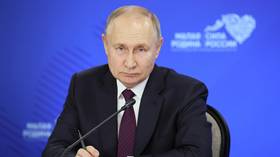EU opposes Ukraine truce – Borrell

EU foreign policy chief Josep Borrell has rejected the notion of peace talks and a ceasefire in Ukraine, instead demanding that the bloc’s member states cough up “whatever it takes” for Kiev to defeat Moscow.
In an op-ed for France’s L’Obs magazine on Tuesday, Borrell urged EU leaders to reject “the temptations of conciliation” with Russia. “These ideas were wrong in 2022, and they remain wrong today,” he wrote, arguing that “we must not let them shape our policy towards Ukraine.”
It is unclear which calls for peace Borrell was referring to. In the EU, Hungarian Prime Minister Viktor Orban has persistently called for a negotiated settlement, arguing that Kiev’s forces cannot win a military victory against their Russian opponents, and that the EU’s sanctions on Moscow hurt EU economies more than they hurt Russia’s.
Borrell, on the other hand, claimed that sanctions have “weakened Russia’s war machine,” despite admitting in a speech one day earlier that they have largely failed to achieve their goals.
“Instead of seeking compromise, we should remember the lessons we have learned since 2022 and redouble our efforts,” Borrell continued.
“We must shift the paradigm from supporting Ukraine for ‘as long as it takes’ to committing to doing ‘whatever it takes’ for Ukraine to win,” he declared, calling for Ukraine to be given “long range missiles and other advanced weapons systems,” including more air-defense batteries.
Ukraine’s demand for arms and ammunition can only be met if there is “a renaissance of the European defense industry,” Borrell wrote.
While Borrell boasted that defense spending across the EU has risen by 40% since 2014, this increase has not been matched by a corresponding increase in arms production. EU member states committed last March to the joint supply of a million artillery shells to Ukraine by March 2024, for example, but only a third of that number has been delivered, and German Defense Minister Boris Pistorius told reporters in November that “the one million target will not be reached.”
Defense contractors across Europe are wary of increasing production without being offered iron-clad contracts from governments, Politico reported last summer. Without such contracts, these firms would be risking a loss if demand for their weapons were to fall in the coming years.
From the outset of the conflict in Ukraine, Borrell has consistently portrayed Russia as the party that was uninterested in peace. Even in March 2022, as Russia offered Ukraine peace terms which former Ukrainian officials now concede were generous, the EU diplomat claimed that Moscow “doesn’t want to sit and negotiate anything: what it wants is to occupy the ground.”
Moscow insists that it has not ruled out a negotiated end to the conflict, but maintains that peace will only be reached when the goals of its military operation in Ukraine are achieved, either by military or diplomatic means.















